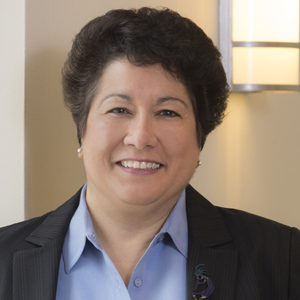
The moment Ana Núñez realized she could actually make a positive impact on medical education occurred mid-rotation when she was a junior clerk in medical school at Hahnemann.
“We didn’t actually have a script to help us read chest X-rays, so I took it upon myself to look at some of the books and put together a little pocket card. It was really well received by the junior clerkship director, who shared it with others.”
All the same, Núñez didn’t quite see herself on a trajectory to academic medicine, given that as a first-generation doctor, completing medical school in and of itself was the goal at the time. In many ways, however, academic medicine chose her as she continued to see opportunities to make an impact.
“I remember as a second-year student, I had finished an exam and hadn’t done as well as I’d hoped. The professor walked by and spoke to me in a very encouraging way, and that was huge to me. Still, I just thought to myself: We should be able to run a medical school better than this. Some of my classmates held their nose during their training and then went to private practice because that was their aspiration. But I was still thinking about how we could do this part better.”
Núñez stayed on at Hahnemann for her residency in internal medicine. She was selected to serve as chief resident and was mentored by clinical educators at more developed stages of their careers.
“When I was involved in the residency administration, I noticed that one of my colleagues, who was a year ahead of me, did a medical education fellowship. In academic medicine, choosing internal medicine can feel like a disadvantage because you don’t do the fellowship, you don’t do the papers and the research. I realized I needed that additional education in my toolkit.”
Later leadership opportunities came during institutional changes, including the MCP-Hahnemann merger. Núñez was tapped to serve as the director of the Women’s Health Education Program and eventually as the principal investigator for the National Center of Excellence in Women’s Health. “There were not a lot of people in that time that intersected across the fields of women’s health, sex- and gender-based biology, and minority health,” she says. “I saw the opportunity to build that out and grow my research portfolio with community-based participatory research.”
With grants from the Department of Health and Human Services, Núñez created the Philadelphia Ujima Initiative. The idea was to work directly in underrepresented communities and bring up lay health ambassadors to offer health education.
That work landed Núñez a position as the associate dean for health, education and research at Drexel and later the associate dean for diversity, equity and inclusion. In 2019, she was recruited by the University of Minnesota Medical School to become its vice dean of diversity, equity and inclusion.
“I came here right after George Floyd’s murder, right about the time when COVID was sort of exploding. It was a pretty challenging time to make that move, but in September, it will be three years here and we have had some wins. Twenty-six percent of our new faculty are diverse, and we’ve been able to successfully push through some really creative and innovative ideas for promoting inclusion and equity.”
Always looking to improve the way things are done and the systems that underlie those functions, Núñez is not resting on her laurels. “The cost of medical education and health disparities in the U.S. are two of the biggest problems we need to confront to improve health care. In addition, we need to add a competency for doctors in advocacy. Doctors are really good at advocating for the patient in front of them because that’s what they do every day. But we need informed, critical thinking voices to advocate for health itself.”
What continues to excite Núñez about working in academic medicine is the sense of potential. “The talent is there but we have to nurture it and make the process more inclusive — there are so many skills and disciplines under the umbrella of medicine, so there is truly something for everyone. We just need to harness all that people power in order to make a difference.”